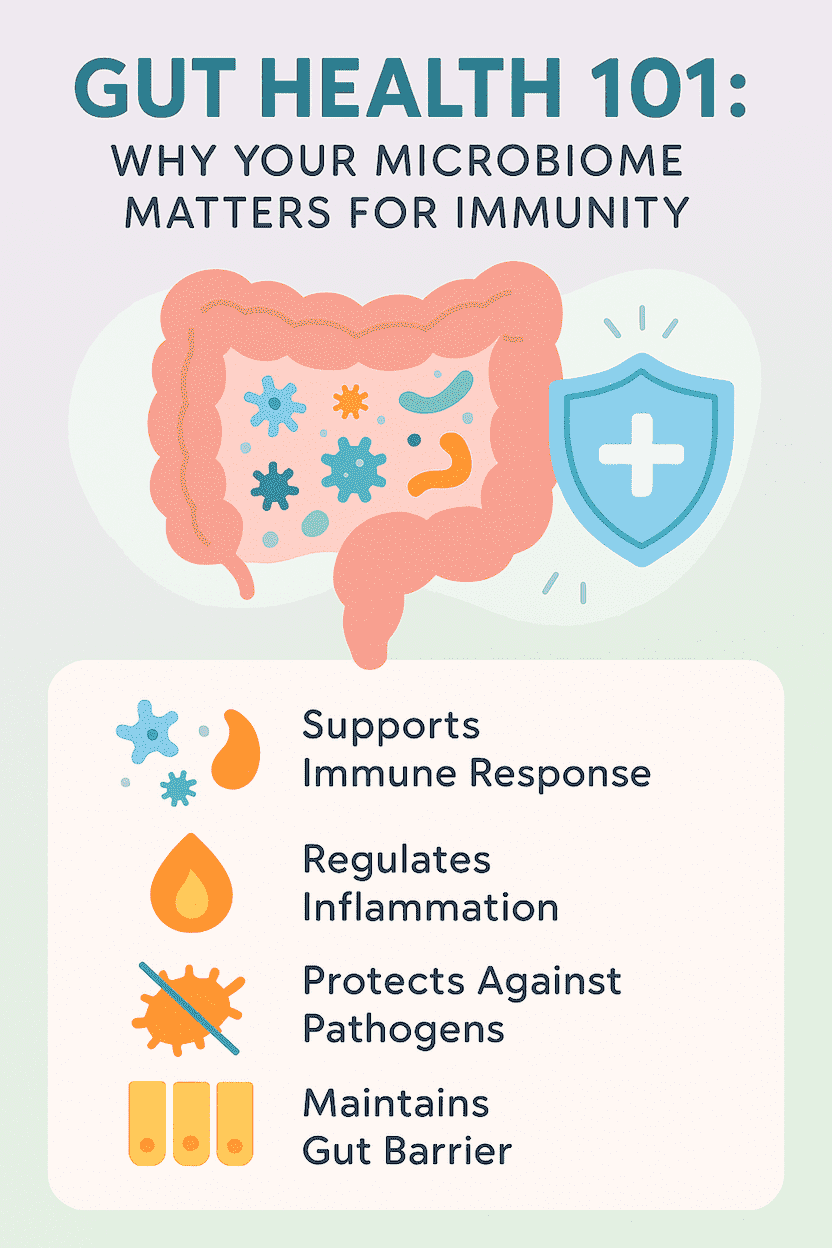Last update: November 6, 2025
6 minute read
Gut Health 101: Why Your Microbiome Matters for Immunity
Your trillions of microbes may hold the key to stronger defenses, better digestion, and even brighter moods.

By Derick Rodriguez, Associate Editor
Edited by Dr. Dimitar Marinov, MD, RDN, PhD

Have you ever wondered why your gut seems to “decide” how the rest of your body feels? Whether you’re fighting off colds more often than you’d like, or struggling with digestion and energy dips, the answer may live in your inner ecosystem: the gut microbiome.
Here’s the fascinating truth: Roughly 38 trillion microbes call your body home, and most of them live in your digestive tract. These aren’t freeloaders. They digest what you can’t, train your immune system, and even send signals to your brain.
In this article, we’ll explore what your gut microbiome is, how it supports your immunity, what throws it off balance, and, most importantly, how you can take care of it.
Key takeaways
- Your gut microbiome has trillions of microbes that influence digestion, health, and immunity
- Around 70% of your immune cells live in your gut, making this relationship essential for defense
- A “healthy gut” isn’t about a perfect mix of bacteria; it’s about whether your microbes are performing the right jobs
What is the gut microbiome?
Your gut microbiome is the bustling community of bacteria, viruses, fungi, and archaea living in your digestive tract. The microbiota are the organisms themselves, while the microbiome includes their genes, byproducts, and the environment they live in.
Think of it like a city: the microbes are residents, each with a job, while the microbiome is the infrastructure, communication, and daily life that keeps everything running. And just like cities, no two microbiomes look exactly alike.

What does the microbiome actually do?
Your microbial community works around the clock, handling three core jobs:
1. Break down food
- Break down fiber-rich carbs and turn them into nutrients your body can actually use.
- Generate short-chain fatty acids (SCFAs) like butyrate that help fortify the gut lining, calm inflammation, and support appetite balance.
- Create essential vitamins like folate and vitamin K that fuel energy and cellular health.
Your body's microbes operate an internal fermentation lab, converting plant-based foods into compounds that strengthen your immune system.
2. Train the immune system
- Train immune cells to tell the difference between helpful allies and harmful threats.
- Block harmful microbes by taking up space and consuming available resources first.
- Strengthen the gut lining, acting like a security gate to prevent toxins from slipping through.
- Send signals to immune cells that help them adjust and balance their responses.
In other words, your microbes act as personal trainers for your immune system.
3. Communicate with your brain
- Send signals through the gut–brain axis that contribute to those “gut feelings” you notice before big events or during emotional moments.
- Modulate your stress response by interacting with the HPA axis
- Note: While gut microbes can stimulate serotonin production in the intestine, this serotonin mainly affects gut function and does not cross into the brain.
Bonus benefits
Your microbiome also influences:
- Skin health (inflammation, acne, eczema)
- Heart health (cholesterol and inflammatory markers)
- Metabolism (weight balance and blood sugar)
It’s not just about your stomach, it’s about whole-body health.
— Dr. Dimitar Marinov, MD, RDN, PhDWhile no single “perfect” microbiome exists, diets rich in fiber, plant diversity, and fermented foods consistently support microbial balance and resilience. Lifestyle factors like sleep, stress control, and regular exercise are equally important in maintaining gut–immune health. By caring for your microbiome, you are directly strengthening one of your body’s most important defense systems.
What shapes your microbiome?
Your microbial community is personal, shaped from birth and constantly evolving.
- Birth method & early feeding: Vaginal delivery and breastfeeding introduce beneficial bacteria, while C-section and formula shape different patterns.
- Diet: Fiber, polyphenols, and fermented foods encourage diversity; processed foods reduce it.
- Lifestyle: Sleep, stress, and exercise influence stability.
- Age & life stages: Puberty, pregnancy, and aging all bring microbial shifts.
Your gut isn’t fragile; it adapts. But it thrives best when consistently supported.
Dysbiosis: When things fall out of balance
Dysbiosis is what happens when helpful microbes decline or harmful ones overgrow. Causes include:
- Broad-spectrum antibiotics that wipe out good and bad bacteria alike.
- Low-fiber, heavily processed diets that starve beneficial microbes.
- Ongoing stress or poor sleep that disrupt microbial balance.
- Infections or long-term health conditions that throw the system off track.
Signs can show up as bloating, irregularity, fatigue, food sensitivities, or more frequent colds. The good news? Like a garden, your microbiome can recover with the right care.

Get your personalized vitamin recommendations in less than 3 minutes.
Get your personalized vitamin recommendations in less than 3 minutes.

How to support gut health for immunity
Feed your microbes fiber
- Aim for diverse plant foods (fruits, veggies, legumes, whole grains).
- Variety fuels microbial diversity.
Add fermented foods
- Yogurt, kimchi, miso, and sauerkraut introduce live microbes.
- Remember: not all fermented microbes qualify as probiotics (clinically tested at specific doses).
Support with lifestyle habits
- Sleep: 7–9 hours keeps microbial rhythms steady.
- Exercise: Walking, cycling, strength training all boost diversity.
- Stress management: Deep breathing, nature time, or journaling help rebalance microbes.
Be smart With medications
- Only use antibiotics when necessary.
- Afterward, replenish with fiber and probiotic support.
Safety & considerations
- No single “perfect” microbiome exists; focus on function, not matching a bacterial profile.
- Supplements vary in quality; look for clinically studied strains.
- If you have chronic gut issues, autoimmune conditions, or are immunocompromised, consult your healthcare provider.
Frequently asked questions (FAQ)
Here are some of the most frequently asked questions about your gut health.
Final thoughts
Your gut microbiome isn’t just a background feature. It’s a dynamic system shaping your digestion, mood, and, most importantly, your immunity.
The secret to a resilient gut isn’t perfection; it’s consistency. Feed your microbes with diverse plants, include fermented foods, move daily, and manage stress.
If you’re curious about the next step, explore personalized supplement options designed to support your unique microbiome. Take our brief health quiz to discover what your gut might need most.
Your microbes are already working hard for you. Time to return the favor.
Sources and references
- Complex regulatory effects of gut microbial short-chain fatty acids on immune tolerance and autoimmunity | Cellular & Molecular Immunology
- Gut-microbiota-targeted diets modulate human immune status: Cell
- Dynamics of Human Gut Microbiota and Short-Chain Fatty Acids in Response to Dietary Interventions with Three Fermentable Fibers | mBio
Editor

Derick Rodriguez
Derick Rodriguez focuses on editing health and wellness-related content. With over half a decade of experience in the digital realm, Derick has developed a unique skill set that bridges the gap between complex health concepts and accessible, user-friendly communication. His approach is deeply rooted in leveraging personal experiences and insights to illuminate the nuances of health and wellness topics, making them more approachable and empowering readers with knowledge and confidence.
Fact checker

Dr. Dimitar Marinov
Dr. Marinov has years of experience in scientific research and preventive and clinical medicine. His publications in peer-reviewed journals are on nutritional status, physical activity, and musculoskeletal disorders among adolescents.
At VitaRx, we're not just passionate about our work — we take immense pride in it. Our dedicated team of writers diligently follows strict editorial standards, ensuring that every piece of content we publish is accurate, current, and highly valuable. We don't just strive for quality; we aim for excellence.
Related posts
While you're at it, here are some other relevant articles you might be interested in.

Get your personalized vitamin recommendations in less than
5 minutes.
Get your personalized vitamin recommendations in less than
5 minutes.






